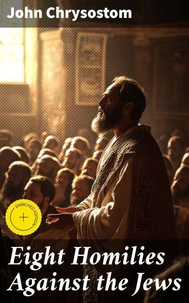Eight Homilies Against the Jews
Par :Formats :
Disponible dans votre compte client Decitre ou Furet du Nord dès validation de votre commande. Le format ePub est :
- Compatible avec une lecture sur My Vivlio (smartphone, tablette, ordinateur)
- Compatible avec une lecture sur liseuses Vivlio
- Pour les liseuses autres que Vivlio, vous devez utiliser le logiciel Adobe Digital Edition. Non compatible avec la lecture sur les liseuses Kindle, Remarkable et Sony
 , qui est-ce ?
, qui est-ce ?Notre partenaire de plateforme de lecture numérique où vous retrouverez l'ensemble de vos ebooks gratuitement
Pour en savoir plus sur nos ebooks, consultez notre aide en ligne ici
- Nombre de pages162
- FormatePub
- ISBN859-65--4701969-5
- EAN8596547019695
- Date de parution29/05/2022
- Protection num.Digital Watermarking
- Taille482 Ko
- Infos supplémentairesepub
- ÉditeurDIGICAT
Résumé
In "Eight Homilies Against the Jews, " John Chrysostom, one of the most influential Church Fathers, presents a passionate and polemical treatise addressing the theological and social tensions between early Christians and Jews in the late fourth century. Written in a rhetorical style, rich with oratorical flourish, Chrysostom employs scriptural exegesis and vivid imagery to critique Jewish practices and beliefs, while simultaneously advocating for a distinct Christian identity.
This work reflects the broader context of a post-Constantinian society where Christianity was becoming increasingly dominant, yet faced pressures to establish its theological legitimacy, often at the expense of its Jewish roots. John Chrysostom's background as a trained orator and his ascetic lifestyle significantly influenced his theological outlook. His role as Archbishop of Constantinople placed him at the center of ecclesiastical power and controversy, providing him with a platform to articulate his views on religious matters.
Chrysostom's vehement critiques are informed by both his pastoral concerns for the Christian community and the sociopolitical climate of his time, ultimately reflecting his desire for conversion rather than merely condemnation. This work is essential for readers seeking to understand the complexities of early Christian-Jewish relations and the rhetorical strategies employed by Chrysostom. Scholars and lay readers alike will find value in delving into his intricate arguments, as the homilies expose the challenges of maintaining faith in an era of theological division, making it a compelling read for those interested in religious history, rhetoric, and the evolution of Christian thought.
This work reflects the broader context of a post-Constantinian society where Christianity was becoming increasingly dominant, yet faced pressures to establish its theological legitimacy, often at the expense of its Jewish roots. John Chrysostom's background as a trained orator and his ascetic lifestyle significantly influenced his theological outlook. His role as Archbishop of Constantinople placed him at the center of ecclesiastical power and controversy, providing him with a platform to articulate his views on religious matters.
Chrysostom's vehement critiques are informed by both his pastoral concerns for the Christian community and the sociopolitical climate of his time, ultimately reflecting his desire for conversion rather than merely condemnation. This work is essential for readers seeking to understand the complexities of early Christian-Jewish relations and the rhetorical strategies employed by Chrysostom. Scholars and lay readers alike will find value in delving into his intricate arguments, as the homilies expose the challenges of maintaining faith in an era of theological division, making it a compelling read for those interested in religious history, rhetoric, and the evolution of Christian thought.
In "Eight Homilies Against the Jews, " John Chrysostom, one of the most influential Church Fathers, presents a passionate and polemical treatise addressing the theological and social tensions between early Christians and Jews in the late fourth century. Written in a rhetorical style, rich with oratorical flourish, Chrysostom employs scriptural exegesis and vivid imagery to critique Jewish practices and beliefs, while simultaneously advocating for a distinct Christian identity.
This work reflects the broader context of a post-Constantinian society where Christianity was becoming increasingly dominant, yet faced pressures to establish its theological legitimacy, often at the expense of its Jewish roots. John Chrysostom's background as a trained orator and his ascetic lifestyle significantly influenced his theological outlook. His role as Archbishop of Constantinople placed him at the center of ecclesiastical power and controversy, providing him with a platform to articulate his views on religious matters.
Chrysostom's vehement critiques are informed by both his pastoral concerns for the Christian community and the sociopolitical climate of his time, ultimately reflecting his desire for conversion rather than merely condemnation. This work is essential for readers seeking to understand the complexities of early Christian-Jewish relations and the rhetorical strategies employed by Chrysostom. Scholars and lay readers alike will find value in delving into his intricate arguments, as the homilies expose the challenges of maintaining faith in an era of theological division, making it a compelling read for those interested in religious history, rhetoric, and the evolution of Christian thought.
This work reflects the broader context of a post-Constantinian society where Christianity was becoming increasingly dominant, yet faced pressures to establish its theological legitimacy, often at the expense of its Jewish roots. John Chrysostom's background as a trained orator and his ascetic lifestyle significantly influenced his theological outlook. His role as Archbishop of Constantinople placed him at the center of ecclesiastical power and controversy, providing him with a platform to articulate his views on religious matters.
Chrysostom's vehement critiques are informed by both his pastoral concerns for the Christian community and the sociopolitical climate of his time, ultimately reflecting his desire for conversion rather than merely condemnation. This work is essential for readers seeking to understand the complexities of early Christian-Jewish relations and the rhetorical strategies employed by Chrysostom. Scholars and lay readers alike will find value in delving into his intricate arguments, as the homilies expose the challenges of maintaining faith in an era of theological division, making it a compelling read for those interested in religious history, rhetoric, and the evolution of Christian thought.


